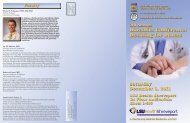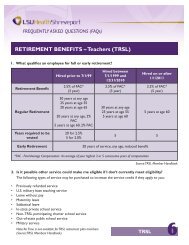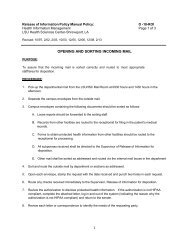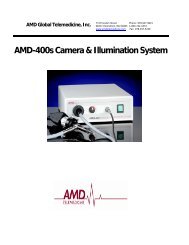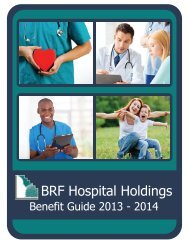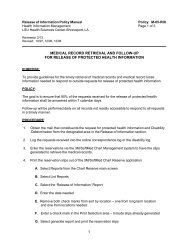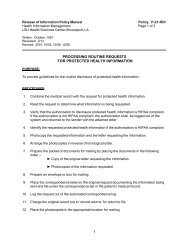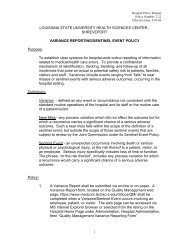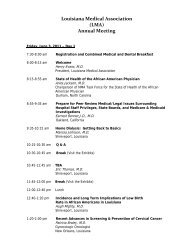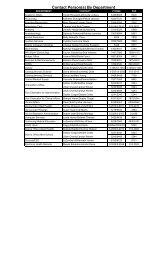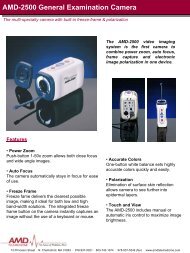School Of Medicine - LSUHSC Medical Communications Home Page
School Of Medicine - LSUHSC Medical Communications Home Page
School Of Medicine - LSUHSC Medical Communications Home Page
Create successful ePaper yourself
Turn your PDF publications into a flip-book with our unique Google optimized e-Paper software.
84 LSU Health Sciences Center at Shreveport <strong>School</strong> of <strong>Medicine</strong><br />
one place of acceptance at any one time. An applicant who accepts<br />
a place in the class is considered to be under obligation to cancel the<br />
acceptance of places that may have been established previously with<br />
other schools. It is also to be understood that if an applicant who has<br />
accepted a place with the <strong>School</strong> of <strong>Medicine</strong> subsequently decides<br />
to attend another school, the applicant will provide prompt notification<br />
of the change in the acceptance status. These and other rights and<br />
responsibilities are found in the AAMC publication: <strong>Medical</strong> <strong>School</strong><br />
Admission Requirements and on their web site.<br />
TECHNICAL STANDARDS FOR MEDICAL<br />
SCHOOL ADMISSION, ACADEMIC<br />
PROGRESSION AND GRADUATION<br />
<strong>Medical</strong> Education requires that the accumulation of scientific<br />
knowledge be accompanied by the simultaneous acquisition of skills<br />
and professional attitudes and behavior. <strong>Medical</strong> school faculties<br />
have a responsibility to society to matriculate and graduate the best<br />
possible physicians, and thus admission to medical school has been<br />
offered to those who present highest qualifications for the study and<br />
practice of medicine. Technical standards presented in this document<br />
are pre-requisite for admission, progression and graduation from<br />
Louisiana State University Health Sciences Center <strong>School</strong> of <strong>Medicine</strong><br />
in Shreveport. All courses in the curriculum are required in order to<br />
develop essential skills required to become a competent physician.<br />
Graduates of medical school must have the knowledge and skills<br />
to function in a broad variety of clinical situations and to render a<br />
wide spectrum of patient care. LSU Health Sciences Center <strong>School</strong><br />
of <strong>Medicine</strong> in Shreveport acknowledges Section 504 of the 1973<br />
Vocational Rehabilitation Act and PL 101-336, the Americans with<br />
Disabilities Act (ADA), but has determined that certain minimum<br />
technical standards must be met by prospective candidates and<br />
students.<br />
A candidate for the M.D. degree must have aptitude, abilities, and<br />
skills in five areas; observation; communication; motor, conceptual,<br />
integrative and quantitative; and behavioral and social. Technological<br />
compensation can be made for some handicaps in these areas, but<br />
a candidate must be able to perform in a reasonably independent<br />
manner. The use of a trained intermediary would mean that a<br />
candidate’s judgment must be mediated by someone else’s power<br />
of selection and observation. Therefore, third parties cannot be used<br />
to assist students in accomplishing curricular requirements in the<br />
five skill areas specified above. Reasonable accommodation can be<br />
made for some disabilities.<br />
Observation<br />
The candidate must be able to observe demonstrations and<br />
participate in experiments in the basic sciences, including, but not<br />
limited to, physiologic and pharmacologic demonstrations in animals,<br />
microbiology cultures, and microscopic studies of microorganisms<br />
and tissues in normal and pathologic states. A candidate must be<br />
able to observe a patient accurately at a distance and close at hand.<br />
Observation necessitates the functional use of the sense of vision and<br />
other sensory modalities. It is enhanced by the functional use of the<br />
sense of smell.<br />
Communication<br />
A candidate should be able to speak, to hear, and to observe<br />
patients in order to elicit information, describe changes in mood,<br />
activity and posture, and perceive nonverbal communications. A<br />
candidate must be able to communicate effectively and sensitively<br />
with patients. Communication includes not only speech, but reading<br />
and writing. The candidate must be able to communicate effectively<br />
and efficiently in oral and written forms with all members of the health<br />
care team. A candidate must possess reading skills at a level to be<br />
able to independently accomplish curricular requirements and provide<br />
clinical care for patients.<br />
Motor Coordination or Function<br />
Candidates should have sufficient motor function to elicit<br />
information from patients by palpation, auscultation, percussion,<br />
and other diagnostic maneuvers. A candidate should be able to do<br />
basic laboratory tests (urinalysis, CBC, etc.), carry out diagnostic<br />
procedures (proctoscopy, paracentesis, etc.) and read EKGs and<br />
X-rays. A candidate should be able to execute motor movements<br />
reasonably required to provide general care and emergency treatment<br />
to patients.<br />
Examples of emergency treatment reasonably required of<br />
physicians are cardiopulmonary resuscitation, the administration of<br />
intravenous medication, application of pressure to stop bleeding, the<br />
opening of obstructed airways, the suturing of simple wounds, and<br />
the performance of basic obstetrical maneuvers. Such actions require<br />
coordination of both gross and fine muscular movements, equilibrium<br />
and functional use of the senses of touch and vision.<br />
Intellectual Conceptual, Integrative and<br />
Quantitative Abilities<br />
These abilities include measurement, calculation, reasoning,<br />
analysis, and synthesis. Problem solving, the critical skill demanded<br />
of physicians, requires all of these intellectual abilities. In addition,<br />
the candidate should be able to comprehend three-dimensional<br />
relationships and to understand the spatial relationships of<br />
structures.<br />
Behavioral and Social Attributes<br />
Candidates must possess the emotional health required for full<br />
use of their intellectual abilities, the exercise of good judgment, the<br />
prompt completion of all responsibilities attendant to the diagnosis<br />
and care of patients, and the development of mature, sensitive and<br />
effective relationships with patients. Candidates must be able to<br />
tolerate physically taxing workloads and to function effectively when<br />
stressed. They must be able to adapt to changing environments, to<br />
display flexibility and to learn to function in the face of uncertainties<br />
inherent in the clinical problems of many patients. Empathy, integrity,<br />
concern for others, interpersonal skills, interest and motivation are all<br />
personal qualities that should be assessed during the admission and<br />
educational processes.<br />
Candidates for the M.D. degree must have somatic sensation and<br />
the functional use of the senses of vision and hearing. Candidates’<br />
diagnostic skills will also be lessened without the functional use of the<br />
senses of equilibrium, smell and taste. Additionally, they must have<br />
sufficient exteroceptive sense (touch, pain and temperature), sufficient<br />
proprioceptive sense (position, pressure, movement, stereognosis<br />
and vibratory) and sufficient motor function to permit them to carry<br />
out the activities described in the section above. They must be able to<br />
consistently, quickly, and accurately integrate all information received<br />
by whatever sense(s) employed, and they must have the intellectual<br />
ability to learn, integrate, analyze and synthesize data.<br />
Louisiana State University Health Sciences Center <strong>School</strong> of<br />
<strong>Medicine</strong> in Shreveport will consider for admission to medical school<br />
any applicant who demonstrates the ability to perform or to learn to<br />
perform the skills listed in this document. Students will be judged not<br />
only on their scholastic accomplishments, but also on their physical<br />
and emotional capacities to meet the full requirements of the school’s<br />
curriculum, and to graduate as skilled and effective practitioners of<br />
medicine. The following technical requirements apply:<br />
1. Is the candidate able to observe demonstrations and participate<br />
in experiments in the basic sciences?<br />
2. Is the candidate able to analyze, synthesize, extrapolate, solve<br />
problems, and reach diagnostic and therapeutic judgments, and<br />
to accomplish this in a timely manner?<br />
3. Does the candidate have sufficient use of the senses of vision<br />
and hearing and the somatic sensation necessary to perform<br />
a physical examination? Can the candidate perform palpation,<br />
auscultation, and percussion?



